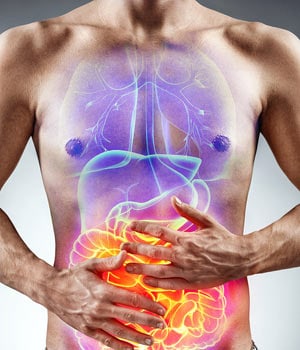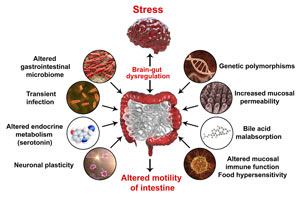What are Irritable Bowel Syndrome Symptoms and Treatments and Can Hypnosis Help?
by Erika Slater
In this article you’ll discover:
- What is Irritable Bowel Syndrome (IBS) symptoms and treatments, and current thinking around these topics.
- The psychological impact of IBS and how it can impact more than just your health.
- How hypnosis can help with the treatment of IBS and the expectations you should have for outcomes.
- Further reading, studies and resource links around IBS and various treatments.
While Irritable Bowel Syndrome (IBS) has been around a long time, what’s different now is medicine is identifying it more readily, as well as more sufferers are seeking medical attention for treatment. Furthermore, the fact our diets of today have become more laden with additives and chemicals has also contributed to IBS being a more common condition.
IBS causes its sufferers tremendous discomfort, pain, and worry. Not knowing when it may strike causes psychological impact leading to stress in itself. For those with severe symptoms it can be a debilitating condition and impact quality of life.
Below I’ll discuss current thinking around what is IBS, its causes and symptoms, and treatments available. How it impacts more than just your health and who’s at greatest risk to develop it. Studies have been conducted on the effectiveness of various treatments in particular around integrative and alternative medicine. I’ll conclude with a section devoted to hypnotherapy and how it can realistically help as a treatment.
Let’s get going…
WHAT IS IRRITABLE BOWEL SYNDROME (IBS)?

IBS is the most common gastrointestinal condition worldwide and the most frequent disorder presented by patients consulting a gastrointestinal specialist – gastroenterologist [1].
IBS can begin in childhood, adolescence, or adulthood and can recur unexpectedly for periods at any age of the individual’s life.
Most people with IBS have unique experiences within the range of known symptoms. IBS conditions can significantly decrease a person’s quality of life.
It’s worth noting only about 40% of those who have IBS symptoms seek help from a physician [1].
IBS has been referred to by many different names – mucous colitis, nervous colon, spastic colon, and irritable colon. IBS often times gets confused with colitis or other inflammatory diseases of the intestinal tract.
WHAT ARE THE SYMPTOMS OF IBS?
Irritable Bowel Syndrome often times has as its most prevalent symptoms abdominal discomforts such as bloating and cramping, and of course the more intense symptoms are chronic diarrhea and/or constipation. Most time individuals will experience a culmination of these symptoms, not only on a weekly basis, but on a daily basis. As the disorder progresses and becomes more intense, the symptoms appear more frequently. The individual who suffers with IBS recognizes the disorder is out of hand when the symptoms are so frequent and intense they hinder their daily living and lifestyles!
When an individual has IBS they’re more prone to a sensitive digestive system with heightened reactivity, so their gastrointestinal tract responds quite differently to normal gut stimuli, such as the passage of solids, gas, and fluid through the intestines. These less than normal movements may result in difficulty passing stool, or sudden and urgent elimination. Up to 20% of those who’ve IBS report untimely passage of stool [1].
Individuals with IBS who experience bowl disorders often times are experiencing stress and anxiety which can exacerbate or perpetuate the symptoms! Bowel experiences and their unpredictability can lead to a high degree of anxiety for IBS patients. Stool consistency may vary enormously, ranging from entirely liquid to so firm and separated that it resembles small pebbles [1].
There are a host of symptoms occurring outside of the digestive tract that often times related and comorbid to IBS. These include; sleep disturbances, fibromyalgia, chronic pelvic pain, back pain, interstitial cystitis, temporomandibular joint disorder, post-traumatic stress disorder, and migraine headaches.
There have been more current studies and stats showing even more prevalent symptoms that can be related to IBS. It was found female patients who have IBS have also reported discomfort during sexual intercourse (dyspareunia). One survey showed 32% have some form of mood disorder, 27% have gastroesophageal reflux disease, and 27% have anxiety disorder [1].
HOW IBS AFFECTS MORE THAN JUST HEALTH:

What often times gets overlooked though are the psychological factors that accompany the illness. Many of those suffering with IBS experience a diverse wide gambit of emotions triggered by IBS that vary in intensity. These psychological and emotional symptoms usually include; anxiety, frustration, depression, shame, fear, self-blame, guilt, anger, low self-esteem leading also to a lack of confidence. This can then create a vicious cycle as the stress and anxiety of these emotional symptoms can lead to worsening of their IBS by “feeding” the condition.
WHAT CAUSES AND TRIGGERS IBS?
As of this moment the primary cause or causes of Irritable Bowel Syndrome hasn’t been determined. IBS presents as a functional disorder with altered patterns of intestinal muscle contractions. According to the Mayo Foundation of Education and Research [2], there are a diverse range of factors contributing to IBS. These factors can include any of the following:
Nervous system issues: When you’ve abnormalities in the nerves in your digestive system, this may cause greater than normal discomfort when the abdomen stretches from gas or stool. Poorly coordinated signals between the brain and the intestines thus cause the body to overreact to changes that normally occur in the digestive process, which can result in pain, diarrhea or constipation.
Muscle contractions in the intestine: We all have muscles in our intestines that aid in moving food through the digestive tract. Unfortunately, sometimes these muscles contract too intensely which can lead to bloating, gas and diarrhea. Conversely, when the muscular contractions are weak, it can lead to constipation.
Inflammation in the intestines: In some instances, IBS sufferers may possess too many immune-system cells in their intestines which actually create the pain as well as the diarrhea.
Changes in bacteria in the gut: Everyone has what is called microflora, which are good bacteria that maintain positive health in the intestines. Research shows those with IBS may have differing microflora than healthy individuals.
Severe Infection: Research has also shown IBS may develop by a severe bout of diarrhea that was induced by a virus or infections.
There are a host of contributing factors leading to the triggering of IBS, even when its been controlled for a long period of time. Food allergies appear to be one of the leading causes of symptoms. Some people experience worse symptoms when they consume wheat or dairy products, and several kinds of fruits, legumes and cabbage. For some it can be spicy foods.
Some individuals have as their triggers, ‘stress’! Many sufferers will assert when they’re under prolonged stressful periods in their lives, or the stress is intense, their IBS flares up. It’s important to note stress exacerbates it, but does not actually cause IBS! Women who have IBS are more prone to develop intense symptoms triggered by hormonal changes. Many women report during menstrual periods, they experience their worst set of symptoms.
WHO IS AT GREATER RISK FOR IBS?
There seems to be various attributes which might make one individual a greater risk for IBS than others. According to the Mayo Foundation of Education and Research [2], a host of factors needs to be considered.
First off, it would appear IBS is more prevalent in females, at least in the USA. Research has shown estrogen therapy, before or after menopause, is a risk factor. It can be more age specific occurring more frequently in people under the age of 50. Furthermore, genes tend to play a role in IBS. Either shared genes or shared environments may come into play. It could also be families share similar eating habits. Finally, one’s mental health and emotional state can serve as triggers. IBS is more common during times of anxiety, depression and other mental health ailments. Furthermore, it’s been linked to mental, emotional, physical and sexual abuse.
IRRITABLE BOWEL SYNDROME TREATMENTS:

Medical treatments usually include; muscle relaxers, anti-diarrheal medications, stool softeners, as well as anti-biotics if there’s intestinal infections or viruses. No doubt these should be prescribed and monitored under the guidance of a medical physician after tests have been run to determine the type and severity of the IBS in a patient. Some doctors may also recommend medications for pain caused by the cramps and discomfort.
Some medical practitioners will prescribe laxatives as well as fiber-based products for those individuals with IBS who have constipation problems. Even though these medications do not need a prescription, they should first be approved by physicians.
For those individuals who suffer from mental illnesses, such as anxiety and depression, they may require anti-depressants and tricyclic antidepressants, a type of medication that relieves depression, as well as inhibit the activity of neurons that control the intestines to help reduce pain.
Most medical doctors will recommend improved dieting which can help reduce the triggers as well as the severity of IBS outbreaks. Doctors may refer patients to a dietitian to make sure they’re eating properly. Most dietitians will recommend patients with IBS to avoid problematic foods that can trigger their symptoms. Furthermore, practitioners will suggest patients’ ‘experiment’ with fiber. The hope with increasing and using fiber is it can reduce constipation. Unfortunately, in some cases the increased fiber diet can lead to gas and bloating, whereby a ‘fiber supplement’ may need to be used to eliminate the issue. This is why a good dietitian comes in to play to help the IBS patient find the proper balance!
There is evidence suggesting that conventional medicine alone isn’t as effective as integrative medicine where the focus is on controlling stress and relieving the symptoms. “In short, IBS is much better treated by integrative medicine than by conventional medicine [3]. There are alternative approaches too such as cognitive behavioral therapy [4], reflexology, reiki, meditation, and hypnosis. All of these approaches are aimed at helping patients with IBS manage and control their stress, which if left untreated can prime the IBS pump.
Hypnosis particularly has a long history of treating IBS and helping sufferers control their symptoms, and there has been sufficient scientific research and studies performed suggesting it as a viable treatment for IBS. It’s also beneficial because it can be applied ongoing. Because of this the next section is devoted to answering the question “can hypnosis help sufferers of IBS?”
CAN HYPNOSIS HELP SUFFERERS OF IRRITABLE BOWEL SYNDROME?

Hypnosis is an altered state of mind and leads to a heightened state of awareness. Individuals are able to shift their focus to specific qualities of an experience and hold them there. This means they can put their attention on thoughts leading to what they want, and avoid focusing on what they don’t want. Our brains are naturally wired to focus on what we don’t want, such as to avoid feeling the pain and stress of IBS leading to their symptoms.
Unfortunately, this negative focus tends to keep the problem in our subconscious. Under hypnosis we can learn to train the unconscious mind to instead focus on the positive – what we want!
In hypnosis, and through tunnel vision, you’re able to isolate, intensify and ingrate your focus on one key perception or experience and hold your concentration there. You only see, hear and feel what you choose to. Everything surrounding the experience gets blocked… the pain and discomfort of IBS!
Under hypnosis, the hypnotherapist offers post-hypnotic suggestions which can be used in the future by a patient. In this case whenever someone with IBS begins to get too stressed out, or they feel the pain from the symptoms of their IBS, the post-hypnotic cues kick in and the individual “nips things in the bud” so to speak before the symptoms overtake them.
Dealing with IBS using hypnosis is also called “gut directed hypnotherapy” and there have been studies conducted to determine the effectiveness for this treatment on IBS. One study was conducted with follow-up over 5 years [5]. Improvements in symptoms and quality of life were experienced by patients in the study. “The beneficial effects did not appear to decline with time since patients who had finished treatment more than five years ago maintained symptom improvement just as well as those who had completed only a year ago. Similarly, extra-colonic features, quality of life, anxiety, and depression scores were still better at follow up compared with pre-HT levels” [5].
The study concluded: “… the beneficial effects of HT are long lasting, with continued improvement in symptoms, thus giving patients better control over their condition” [5].
The International Foundation for Functional Gastrointestinal Disorders – IFFGD –
wrote “research has found that hypnotherapy may help improve the primary symptoms of IBS. It may also help relieve other symptoms suffered by many people with IBS such as nausea, fatigue, backache, and urinary problems. Hypnotherapy appears to offer symptomatic, psychological, and physiological benefit” [6].
Multiple hypnosis sessions with a qualified hypnotherapist should be planned for gut hypnotherapy. The number of sessions can vary depending on type and severity of symptoms but will fall within the range of 2-12 weekly sessions. Ongoing therapeutic treatment can be accommodated by more sessions, use of recorded sessions on CD/MP3 media, and training for the patient by the hypnotist in self-hypnosis, or a combination of all of these. Most professional hypnotists can teach self-hypnosis to clients as part of their program. Self-hypnosis is the ability of a client to enter the hypnotic trance state by themselves without the guidance of a hypnotist.
While hypnosis offers an effective treatment for those suffering with IBS this doesn’t mean other treatments should be abandoned, and common sense would suggest paying attention to a healthy diet “soft on your gut” is an important component as well, and coming off medication should always be discussed with your doctor first.
Hypnosis offers a viable treatment for Irritable Bowel Syndrome and your next step should seek out a professional hypnotherapist with experience in treating the condition and discussing with them if it’ll be able to help and ease the symptoms you’re experiencing.
CONCLUSIONS:
Irritable Bowel Syndrome seems to be one of those modern conditions but in reality, has been around for a long time. IBS can be debilitating for sufferers impacting their quality of life and even making them housebound and shunning social contact outside their home.
While you should seek out advice from your Doctor and consider medical treatment for your symptoms, current thinking is integrative medicine and some alternative therapies offer more viable long treatment for the condition.
One of the treatments available is hypnosis, and this helps control common triggers for bringing on IBS. Because there’s a strong link between stress and triggering of IBS, hypnosis provides a treatment to reduce stress and lessen the symptoms of the condition. If Irritable Bowel Syndrome is putting limits on your life the check out this self-hypnosis session for IBS here >>>
ADDITIONAL RESOURCES RELATED TO IRRITABLE BOWEL SYNDROME:
[1] Irritable Bowel Syndrome (IBS) – Canadian Society of Intestinal Research >>>
[2] Irritable Bowel Syndrome – Mayo Clinic >>>
[3] Hypnosis for IBS? – Andrew Weil, M.D. >>>
[4] Cognitive Behavioral Therapy (CBT) 101 >>>
[5] Long Term Benefits of Hypnotherapy for Irritable Bowel Syndrome >>>
[6] Hypnosis for IBS – International Foundation for Functional Gastrointestinal Disorders >>>
Library of Self-Hypnosis Downloads Products >>>
Erika Slater CH
Free At Last Hypnosis
Massachusetts
CATEGORIES
FEATURED POSTS
Interested in making a significant change in your life and interested in learning more about what I do and how I do it? Discover my hypnotherapy services here or contact me here.

DISCOVER HOW TO START CHANGING HABITS TODAY.
In this free audio hypnosis session, you’ll experience the power of your subconscious mind to begin to change your habits. If you've never experienced hypnosis before then this is a great introduction...


